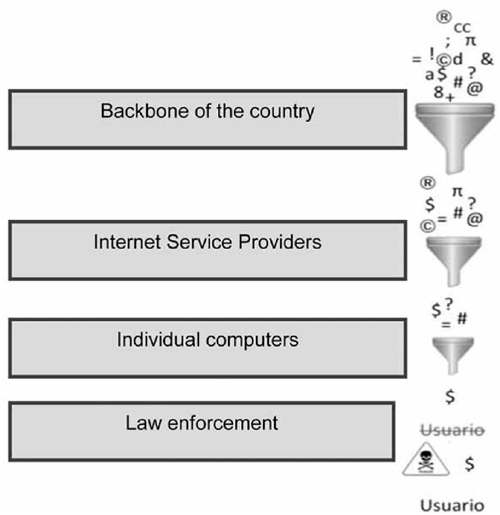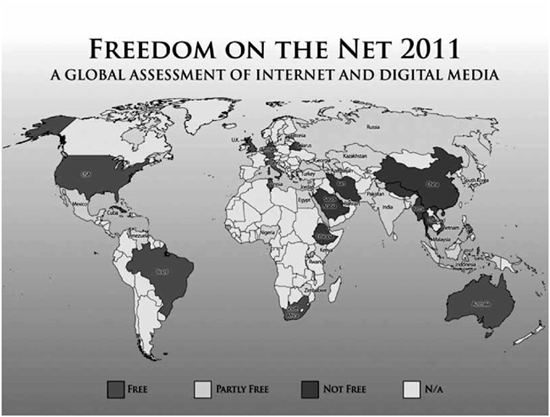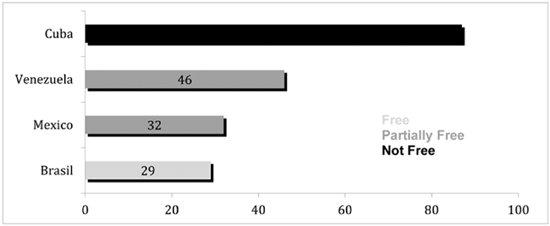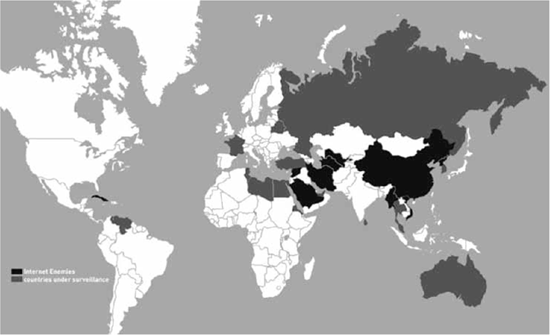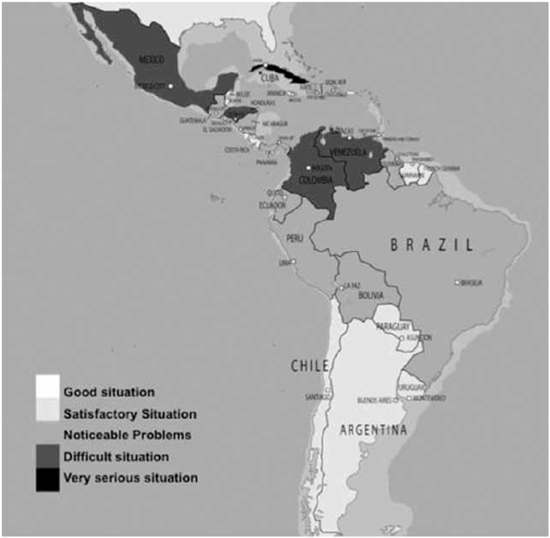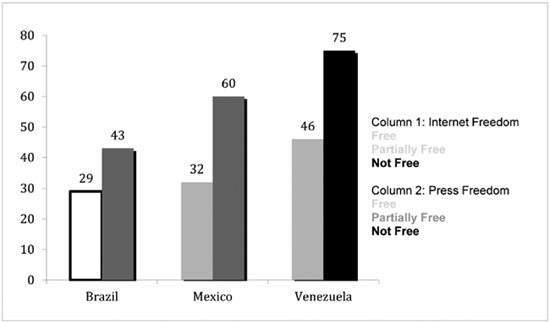Internet Content Filtering in Latin America: Reasons and Impacts on Freedom of Expression
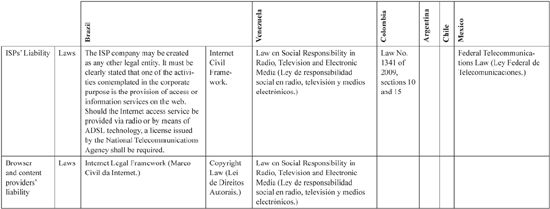
Chapter 14
Internet Content Filtering in Latin America: Reasons and Impacts on Freedom of Expression1
Joana Varon Ferraz, Carlos Affonso Pereira de Souza, Bruno Magrani and Walter Britto
Introduction
In December 2010, the Venezuelan Congress approved a bill to regulate access to content and the use of Internet in the country. The bill was proposed to amend the Law on Social Responsibility in Radio and Television (Ley de Responsabilidad Social en Radio y Televisión, also known as Ley Resorte), which already restricts content broadcast by radio and television stations. Under this amendment, access to websites that distribute messages or information that ‘may be contrary to national security’ or that seek to ‘discredit legitimately constituted authorities’ may be restricted. Moreover, it establishes that Internet Service Providers (‘ISPs’) would be required to establish mechanisms capable of restricting the dissemination of messages, access to portals and disclosure of information related to the actions foreseen under this regulation. According to Reporters Without Borders, such provisions would enable indiscriminate Internet filtering mechanisms in clear detriment of freedom of access to information.2 As reported by NGO Espacio Público:
the project contains serious deficiencies regarding good legislative practice, which allows officials who have the responsibility of enforcing this legal instrument to act arbitrarily and discretionarily, which constitutes per se a violation of the human right of freedom of expression and leads to a selective and interested enforcement.3
In Mexico, the Party of the Democratic Revolution (Partido de la Revolución Democrática) has submitted a bill on the monitoring and regulation of the use of social networks in the country. According to the bill, the mere exchange of information that helps others to violate the law would be considered a crime. Norberto Nazario, the proponent of the bill, claimed it was intended to help monitor and hamper the way drug cartels are using the net. Mexican Internet users had a critical reaction to the proposal: many have asserted that the law would serve as a mere excuse for the government to increase surveillance; they have even used the term ‘Big Brother’ to refer to the position the police has sought to take.
Also very critical, in April 2011, the Ministry of Justice from Colombia has presented a bill that intends to regulate Internet content. The text allows ISPs to remove or block access to content preventively, in case someone claims that such content violates copyrights. Civil society has expressed its concerns about the law, calling it the Colombian version of the French Hadopi Law,4 which provided a three-strikes procedure to suspend the Internet connection for violation of copyrights.
In Brazil, in 2007, access to YouTube was blocked for a few hours under a court decision issued on a privacy/image violation claim involving Daniela Cicarelli, a Brazilian celebrity. She had been exposed in an amateur video that captured intimate moments of her and her boyfriend at a beach. Though not so recent, the Cicarelli case turned out to be paradigmatic among Brazilian jurists, and triggered the debate about how internet regulation could foster the protection of rights in the digital environment.5
The right of every citizen to seek, receive and share information is protected under the Universal Declaration of Human Rights and the International Covenant on Civil and Political Rights (ICCPR). Specifically regarding Latin American countries, the Pact of San José, officially known as the American Convention on Human Rights, which was ratified by most countries of the region, establishes rules on censorship at article 13. Similarly, the Tunis Agenda also recognizes these rights within the Information Society, item 42 reaffirms their commitment to ‘the freedom to seek, receive, impart and use information, in particular, for the creation, accumulation and dissemination of knowledge’. Most importantly, the same item affirms that:
measures undertaken to ensure Internet stability and security, to fight cybercrime and to counter spam, must protect and respect the provisions for privacy and freedom of expression as contained in the relevant parts of the Universal Declaration of Human Rights and the Geneva Declaration of Principles.6
However, despite the fact that freedom of expression depends on the free flow of information, there is a tendency for national and regional laws and judicial orders to intervene in the end-to-end architecture of the Internet, preventing the free flow of information and thus undermining the rights of every citizen to freedom of expression and privacy.
There is a tendency towards increasing online censorship, as several Latin American governments and governments around the world7 have proposed legal texts that impose: criminalization of legitimate expressions; liability of intermediaries; disconnection of users based on copyright violation or transmission of illegal information (such as pornography, drug trafficking, cyber-attacks, etc.), or even legislation that establish arbitrary mechanisms to filter, block and remove content from the net.
All those provisions are rather reprehensible, as they not only jeopardize the fundamental rights to privacy and freedom of expression of citizens, but also pose a threat to some of the key elements of the network architecture, such as neutrality and openness. Meanwhile, though developed countries have already established a legal framework for the Internet, the movement in Latin America is still recent. Such context provides more room for reflection, as the criticism of previous foreign legislation can be educational on what went wrong in those experiences and lead to a more balanced perspective on how to avoid the same pitfalls and at the same time guarantee that freedom-related issues will be taken into account with a regional perspective.
At this point in time, in which Latin American countries are beginning to regulate the internet, this chapter aims to explore recent legislation, court decisions and Internet policies in Brazil, Argentina, Chile, Colombia, Mexico and Venezuela,8 focusing on filtering and content removal cases. It will attempt to evaluate whether the most recent approaches have been consistent with the guaranteed protection of the right to freedom of expression. The chapter is organized into five sections: (I) a brief analysis of the meaning of filtering and the fine line that separates it from violation of freedom of expression; (II) a brief overview of studies on the current situation of online freedom of expression in these countries and future trends; (III) analysis of the legal provisions of these countries concerning (1) universal and (2) neutral access to the Internet’s infrastructure, as well as (3) access to content and their impact on filtering practices; (IV) filtering and Internet Service Providers liability; and (V) conclusion.
The Meaning of Filtering
Just as the advances in technology have led to an unprecedented and immeasurable access to information, technical innovations also provide ways of controlling the flow of information in the networks. It is necessary to take into account that part of this control has been driven by the need to maintain and improve the quality and security of services in the network, such as screening out spam and viruses. Thus, the key question is: to what extent is it possible to allow such control in the flow of information in order to guarantee both the well-functioning of the network and the protection of fundamental rights? Nonetheless, if it is true that efforts are being made to use technology to block content that is considered unwanted, a second question, as important as the first one, would be: what is ‘unwanted’ content?
A UNESCO report called Freedom of Connection, Freedom of Expression: The Changing Legal and Regulatory Ecology Shaping the Internet addresses this problem. As information and communication flows online, it may use several Internet related protocols and pass through various points in the Internet network until it reaches the user’s access devices. Taking this into consideration, the mentioned Report indicates that the most common points at which filtering practices can be applied include:9
Gateways to the Internet backbone: State-directed implementation of filtering and blocking technologies may be carried out at the backbone level, which constitutes the foundation of the network, such as international gateways in order to eliminate access to certain content throughout an entire country.
Internet Service Providers: There is a dangerous tendency to have ISPs filter illegal or immoral content, or prevent search results from specified websites. These providers also filter spam and attempt to prevent infection by malware for reasons of stability and user protection.
Institutions: Companies, libraries, schools etc. can filter content on the basis of their own criteria and for their own purposes, and/or on the basis of guidelines from state authorities.
Individual Computers: Each person may install filtering software on their own computer to restrict the ability to access certain content and/or protect their safety.
Law Enforcement: Actions are also taken against users who engage in practices that are considered illegal on the network, such as fraud, unlawful sharing of music etc.
Therefore, Internet content can be regulated through those technical approaches implemented at different levels of access to the network. The UNESCO report seeks to find out precisely whether the content regulations have clear and reasonable limits for a potential filtering method and whether the filtering methods have taken into consideration at least the legal provisions, or have instead been developed to influence culture and politics by determining which content should be controlled, consumed or produced, promoting excuses such as censorship of political speech, abusive protection of copyright, etc.
Finally, it is important to highlight that filtering techniques are not precise, i.e., it is almost impossible to block specific content without affecting others. However, many of the mechanisms used to regulate and censor information are increasingly more sophisticated and sometimes use many layers of control, which are often hidden from the common user, who will probably not even notice that the information is being filtered. So there are questions that still remain unanswered: Is filtering really necessary? If so, under which circumstances? What content should be controlled and in which way? What is the adequate level of transparency? The balance between the technical need of filtering practices, the political and social need and the respect for freedom of expression are the topics we intend to approach in our analysis of the policies, laws, court decisions and practices of the six selected countries.
Brief Overview of Freedom of Expression in Latin America: Recent studies and future trends
Among many reports on freedom of expression on the internet, some conclusions can be reached when focused specifically on the Latin American region.
Figure 14.1 Where Filtering Methods can be Applied
Source: Prepared by the authors based on the UNESCO report10
Freedom House, in collaboration with the United Nations Democracy Fund (UNDEF), has released a report entitled ‘Freedom on the Net, a Global Assessment of Internet and Digital Media’.11 Covering the period from January 1, 2009 to December 31, 2010, it comprised a series of interviews and surveys divided into the following thematic groupings:
• Obstacles to Access: including infrastructural and economic barriers.
• Limits on Content.
• Violations of User Rights: including legal protections and restrictions on online activity; surveillance and limits on privacy and prosecution of online activity.
The answer to each question received a score from 0 (best) to 100 (worst) allowing for comparative analysis among the countries surveyed. The report is based on the definition of freedom of expression provided by article 19 of the Universal Declaration of Human Rights. Accordingly, the project evaluates the freedom of transmission and exchange of news and other politically relevant communications, as well as the protection of user’s rights to privacy and freedom to express their ideas on the net from both legal and extra-legal repercussions arising from their online activities. The project considers that freedom of expression may only be restricted in some strictly defined circumstances, and provided that such restrictions are both transparent and implemented in line with international human rights standards, the rule of law, and the principles of necessity and proportionality. Thus, countries scoring between 0 to 30 points were regarded as Free, 31 to 60 as Partly Free and 61 to 100 as Not Free. Rankings of course always lead to questionable generalizations, but the map below (Figure 14.2) allows us to have a general idea of the position of some Latin American countries compared with the rest of the world as regarding freedom of expression on the net.
Figure 14.2 Global Assessment of Internet and Digital Media
Source: Freedom on the Net 2011, Global Assessment of Internet and Digital Media, Freedom House, http://www.freedomhouse.org/sites/default/files/FOTN2011.pdf.
As the map indicates, from the Latin American countries, Freedom House’s investigation only includes Brazil, Mexico, Venezuela and Cuba. Only Cuba is identified as a Not Free country, while Mexico and Venezuela show some restrictions to freedom and Brazil respects the possible limits to freedom of expression. The law in force in these countries is compared with the laws and practices of other countries, such as China, Iran, Saudi Arabia and Cuba (which are known to be extremely repressive with respect to this issue, approaching 100 points and equating this score with totally unacceptable limits; this has led to some criticism as to what can actually be considered a free country in the ranking).
Figure 14.3 Online Freedom of Expression in Latin America
Source: Freedom on the Net 2011, Global Assessment of Internet and Digital Media, Freedom House
Figure 14.3 shows the scores of each of the Latin American countries that were included in the report, revealing significant differences between the scores of Brazil, Mexico and Venezuela.
With a less complex methodology, but based on a survey of empirical cases of censorship on the net, Reporters Without Borders also published a report in March 2011 where, among the Latin American countries, Cuba was identified as an enemy of the Internet and Venezuela as a country under surveillance, as shown in the map below (Figure 14.4).
Figure 14.4 Internet Enemies 2011
Source: Reporters Without Borders for Press Freedom, Internet Enemies, March 2011, http://12mars.rsf.org/i/Internet_Enemies.pdf.
Figure 14.5 Freedom of the Press in Latin America 2010
Source: Reporters Without Borders, Freedom of the Press Worldwide in 2010
Even though we do not have final data on freedom of expression on the Internet for the whole of Latin America, Reporters Without Borders has published a ranking on freedom of the press for the whole region. This ranking takes into consideration events between September 1, 2009 and September 1, 2010 and is based on questionnaires distributed among, and answered by, 178 countries. The study does not address human rights violations in general and considers only press freedom violations, i.e. violations directly affecting journalists – such as murders, imprisonment, physical attacks and threats – violations to press freedom in the new media – such as violations of the free flow of information on the Internet – and also the degree of impunity enjoyed by those responsible for these press freedom violations.
The map shows that none of the countries of the region is in a good situation. Among the countries on which the report is focused, while Chile and Argentina have a satisfactory situation, Brazil has some noticeable problems and Venezuela, Colombia and Mexico are considered countries in a difficult situation. Cuba is, once again, identified as a country in a very serious situation.
In fact, as the map shows, censorship and freedom of the press are already a matter of concern in the region. As the region increases its Internet penetration rates in the population, we should be watchful to avoid that such a critical profile be extended to all the other spaces of freedom of expression, which go beyond freedom of the press.
Figure 14.6 Freedom of Expression on the Internet vs. Freedom of the Press in some Latin American Countries
Source: Freedom on the Net 2011, Global Assessment of Internet and Digital Media, Freedom House
In this sense, interestingly enough, Freedom House’s investigation compares its freedom of expression on the net rates with another study which applied a similar methodology but dealt only with freedom of the press. Figure 14.5 highlights that there is a considerable difference in the performance of those countries on the rates of the two studies, with censorship to freedom of the press attaining even more concerning numbers. As the digital divide is bridged and the press activities and flow of information increasingly depend on the net, the question remains whether those high rates of press repression may potentially pose a threat to the future of online freedom of expression in the region. We should keep in mind and closely watch this possible trend to prevent it from becoming a reality.
It is also important to add that the mere absence of investigations about freedom of expression on the Internet including complete data for all the Latin American countries is already worrisome per se. Even though other regions of the world have inspired greater concern in this regard given the existence of serious violations to human rights, we should not ignore what has happened and what may happen in the future of the Internet in Latin America, particularly in the current context of redefinition of the regulatory frameworks for the Internet in the region.
Analysis of Legal Provisions on Filtering Practices
Universal Access Policies
Bridging the digital divide between Latin American countries and developed countries is still one of the region’s major challenges. According to data from the Regional Broadband Observatory (Observatorio Regional de Banda Ancha or ORBA), which was launched in May 2011 by the Economic Commission for Latin America and the Caribbean (ECLAC), the percentage of the Latin American and Caribbean population who has mobile broadband services went from 0.2 percent in 2005 to 4.7 percent in 2009, while within member countries of the Organization for Economic Cooperation and Development (OECD), the proportion rose from 5 percent to 49 percent in the same period. However, the differences in access in the same countries are also impressive.
Still according to the ECLAC, one of the main factors that determine the take-up of broadband is its price. According to the Commission, in March 2011, the average regional price for fixed broadband was 72.8 dollars per megabyte per second (mbps), compared with 5.9 dollars per mbps in OECD countries, which is a huge difference. This situation constitutes the main obstacle to free access to network content, because it restricts access even before the implementation of any filtering method.
Faced with this situation, all the countries examined are trying to develop regulations focused on guaranteeing the right to Internet access. Some of them, as Brazil, have also been discussing regulations to improve quality of access, concerning quality patterns for broadband to the telecommunications services. Establishing the right to access is indeed a priority issue, whether analysing laws that have recently entered into effect or bills that are still being debated. It is worth highlighting that there is still little competition among Latin American Internet Access Providers, which is a common consequence of a not always very well conducted privatization processes or of the existence of state monopoly providers. Therefore, government strategies to expand access can sometimes be contradictory, with some allowing too much leeway to the Internet Service Providers while not properly facing the monopoly situation.
In addition to these technical and economic issues that prevent universal access to the net, there are also economic interests from telecom companies, as access providers, to bypass the principle of net neutrality, topic addressed in a separate section.
Network Neutrality
Even though net neutrality is actually a technical concept concerning network administration, the principle of net neutrality clearly interferes with the access to content and may also, although it isn’t its primary objective, protect freedom of speech when dully guaranteed. To analyse how the network neutrality principle has been implemented and debated in different countries, we will first briefly describe its general meaning and the basic problem to which this principle refers; then, we will present a comparative chart of how the principle was applied or is being discussed in the different countries included in this study; and finally, we will provide a comparative analysis of the alternatives.
Network neutrality is a principle of network architecture that establishes that all Internet data must be treated equally, i.e. without favouring any application, content or service provider.12 Thus, it is possible to ensure the free flow of information, without discrimination on the grounds of origin, destination, protocol or content. To implement this principle, Internet Access and Service Providers must transport data packets in a neutral manner, without favouring certain contents and disfavouring others.13
